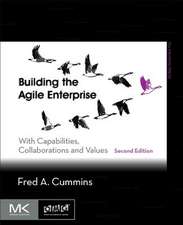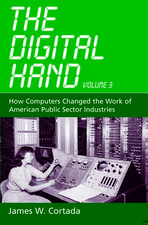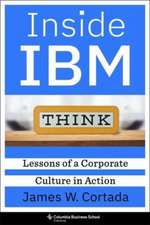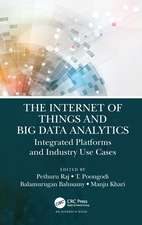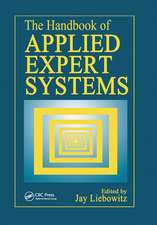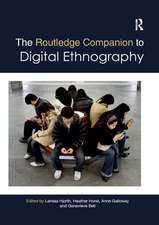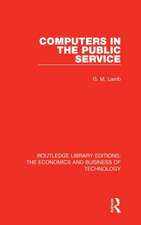Living with Computers: The Digital World of Today and Tomorrow
Autor James W. Cortadaen Limba Engleză Paperback – 12 mar 2020
Taking a big-picture perspective on digital technology, Living with Computers leads the reader on a whistle-stop tour of the history of information and information technology. This journey culminates in a deep exploration into the meaning and role of computers in our lives, and what this experience might possibly mean for the future of human society – and the very existence of humanity itself.
In the face of the transformative power of computing, this book provokes us to ask big questions. If computers become integrated into our bodies, merging with the information processing of our very DNA, will computing help to shape the evolution of biological life? If artificial intelligence advances beyond the abilities of the human brain, will this overturn our anthropocentrism and lead to a new view of reality? Will we control the computers of the future, or will they control us? These questions can be discomforting, yet they cannot be ignored. This book argues that it is time to reshape our definition of our species in the context of our interaction with computing. For although such science-fiction scenarios are not likely to happen any time soon – and may, in fact, never happen – it is nevertheless vital to consider these issues now if we wish to have any influence over whatever is to come. So, humans, let’s confront our possible destiny!
James W. Cortada is a Senior Research Fellow at the Charles Babbage Institute at the University of Minnesota. He holds a Ph.D. in modern history and worked at IBM in various positions for 38 years, including in IBM’s management research institute, The IBM Institute for Business Value (IBV). He is the author of over a dozen books on management, andnearly two dozen books on the history of information technology. These include the Springer title From Urban Legends to Political Fact-Checking: Online Scrutiny in America, 1990-2015 (with William Aspray).
Preț: 88.67 lei
Preț vechi: 110.84 lei
-20% Nou
Puncte Express: 133
Preț estimativ în valută:
16.97€ • 17.76$ • 14.12£
16.97€ • 17.76$ • 14.12£
Carte disponibilă
Livrare economică 10-24 martie
Preluare comenzi: 021 569.72.76
Specificații
ISBN-13: 9783030343613
ISBN-10: 3030343618
Pagini: 115
Ilustrații: XVIII, 115 p. 2 illus.
Dimensiuni: 155 x 235 mm
Greutate: 0.2 kg
Ediția:1st ed. 2020
Editura: Springer International Publishing
Colecția Copernicus
Locul publicării:Cham, Switzerland
ISBN-10: 3030343618
Pagini: 115
Ilustrații: XVIII, 115 p. 2 illus.
Dimensiuni: 155 x 235 mm
Greutate: 0.2 kg
Ediția:1st ed. 2020
Editura: Springer International Publishing
Colecția Copernicus
Locul publicării:Cham, Switzerland
Cuprins
Introduction: Why Listen to Me? Why You Should Take Seriously Your Own Knowledge of Computers.- What Is Computing?.- How Did We Get Here?.- Early Views of Computing.- How People View Computing Today.- How We Might See the End of the Information Age.- Life in a Post-Information Era.- Is It the End of Our World? How to Think About Implications and Challenges.- How to Live with Computers.
Recenzii
“Living with Computers covers a lot of ground in just over 100 pages. … I did find the book engaging. For those looking for a short overview of some of the main issues on the future of computing and AI this book would be of interest.” (Adam John Andreotta, Metascience, January 21, 2021)
Notă biografică
James W. Cortada is a Senior Research Fellow at the Charles Babbage Institute at the University of Minnesota. He holds a Ph.D. in modern history and worked at IBM in various sales, consulting, management, and executive positions for 38 years, including in IBM’s management research institute, The IBM Institute for Business Value (IBV). There, he led and participated in over three dozen global studies on the use of information and business managerial practices. He is also the author of over a dozen books on the management of business, information technologies, and management. He also authored nearly two dozen books on the history of information technology, its business practices and industry, and about knowledge management. These include the Springer title From Urban Legends to Political Fact-Checking: Online Scrutiny in America, 1990-2015 (with William Aspray). His articles on the history of information have appeared in many of the “journals of record” for each topic he has studied, including Information and Culture, Library and Information History, Business History Review, IEEE Annals of the History of Computing, Enterprise and Society, and Technology and Culture, among others. He serves on the editorial boards of Information and Culture, Library and Information History, and IEEE Annals of the History of Computing.
Textul de pe ultima copertă
The computing technology on which we are now so dependent has risen to its position of ascendency so rapidly that few of us have had the opportunity to take a step back and wonder where we are headed. This book urges us to do so.
Taking a big-picture perspective on digital technology, Living with Computers leads the reader on a whistle-stop tour of the history of information and information technology. This journey culminates in a deep exploration into the meaning and role of computers in our lives, and what this experience might possibly mean for the future of human society – and the very existence of humanity itself.
In the face of the transformative power of computing, this book provokes us to ask big questions. If computers become integrated into our bodies, merging with the information processing of our very DNA, will computing help to shape the evolution of biological life? If artificial intelligence advances beyond the abilities of the human brain, will this overturn our anthropocentrism and lead to a new view of reality? Will we control the computers of the future, or will they control us? These questions can be discomforting, yet they cannot be ignored. This book argues that it is time to reshape our definition of our species in the context of our interaction with computing. For although such science-fiction scenarios are not likely to happen any time soon – and may, in fact, never happen – it is nevertheless vital to consider these issues now if we wish to have any influence over whatever is to come. So, humans, let’s confront our possible destiny!
James W. Cortada is a Senior Research Fellow at the Charles Babbage Institute at the University of Minnesota. He holds a Ph.D. in modern history and worked at IBM in various positions for 38 years, including in IBM’s management research institute, The IBM Institute for Business Value (IBV). He is the author of over a dozen books on management,and nearly two dozen books on the history of information technology. These include the Springer title From Urban Legends to Political Fact-Checking: Online Scrutiny in America, 1990-2015 (with William Aspray).
Taking a big-picture perspective on digital technology, Living with Computers leads the reader on a whistle-stop tour of the history of information and information technology. This journey culminates in a deep exploration into the meaning and role of computers in our lives, and what this experience might possibly mean for the future of human society – and the very existence of humanity itself.
In the face of the transformative power of computing, this book provokes us to ask big questions. If computers become integrated into our bodies, merging with the information processing of our very DNA, will computing help to shape the evolution of biological life? If artificial intelligence advances beyond the abilities of the human brain, will this overturn our anthropocentrism and lead to a new view of reality? Will we control the computers of the future, or will they control us? These questions can be discomforting, yet they cannot be ignored. This book argues that it is time to reshape our definition of our species in the context of our interaction with computing. For although such science-fiction scenarios are not likely to happen any time soon – and may, in fact, never happen – it is nevertheless vital to consider these issues now if we wish to have any influence over whatever is to come. So, humans, let’s confront our possible destiny!
James W. Cortada is a Senior Research Fellow at the Charles Babbage Institute at the University of Minnesota. He holds a Ph.D. in modern history and worked at IBM in various positions for 38 years, including in IBM’s management research institute, The IBM Institute for Business Value (IBV). He is the author of over a dozen books on management,and nearly two dozen books on the history of information technology. These include the Springer title From Urban Legends to Political Fact-Checking: Online Scrutiny in America, 1990-2015 (with William Aspray).
Caracteristici
Poses deep questions about the impact that future computing technology may have on humanity Considers the possibility that computing technology may merge with the biological world, and the implications of this Asks what influence we can have on such developments, and whether we will control the computer, or the computer us

